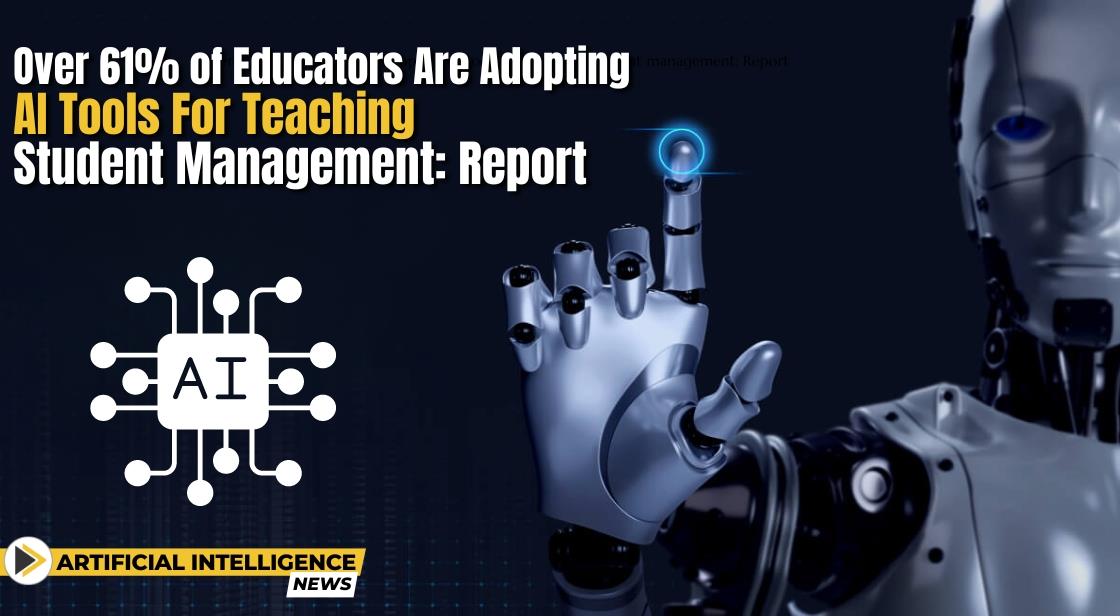AI Integration in Education: Over 61% of Educators Embrace Technological Reform, Reveals Report

News Synopsis
In the rapidly evolving landscape of education, Artificial Intelligence (AI) is making significant strides, with more than 61% of educators globally embracing AI tools for teaching, student preparation, and management, according to a comprehensive report by TeamLease EdTech.
The study, titled "Revolutionizing Classrooms: The Impact of Generative AI on the Future of Education," sheds light on the educators' perspectives on AI's role in shaping the future of learning.
Key Findings:
AI's Crucial Role: The report indicates that 63.61% of educators view AI as crucial for preparing students for a future dominated by AI technologies, highlighting its potential to enhance educational methodologies.
Concerns and Perceptions: While the majority embraces AI, 9.49% of educators express concerns, fearing the diminishing human interactions in teaching, over-reliance on technology, and apprehensions about data privacy and information accuracy.
Upskilling Potential: A significant 66.77% of educators recognize the potential of AI tools for upskilling purposes, showcasing a positive outlook on leveraging technology to enhance educational outcomes.
Influence of AI vs. Smartphone Revolution: The study indicates that 70.85% of educators believe AI has a stronger influence than the smartphone revolution, emphasizing the transformative impact of AI in the education sector.
Educator Perspectives:
Shantanu Rooj, Founder and CEO of TeamLease Edtech, emphasizes, "This report underscores the fact that AI is no more than just an emerging technology but a reality that is already reshaping classrooms across India."
Educator Training and Ethical Considerations:
AI Training for Educators: More than 50% of educators advocate for AI training for teachers, recognizing the technology's role in reducing the time spent on class preparation.
Wary Outlook and Regulatory Suggestions: Despite the positive sentiments, over 80% of respondents express wariness toward AI technology, emphasizing the need for government monitoring and regulation to address concerns about risks and ethical implications.
Educator Preferences:
Balanced Approach: The majority (62.88%) of educators favor a balanced approach to AI use in classrooms, while a smaller percentage (17.05%) supports unrestricted AI use.
Concerns and Cautious Optimism:
While the majority of educators are embracing AI, a significant 9.49% remain apprehensive. Their concerns revolve around:
-
Potential diminishing of human interactions in teaching: Educators fear AI might replace the crucial human element in education, leading to a loss of personalized interaction and connection between teachers and students.
-
Over-reliance on technology: Educators worry about students becoming overly dependent on AI tools, hindering their critical thinking and problem-solving skills.
-
Data privacy and accuracy of information: Concerns exist regarding the security and ethical use of student data, as well as the potential for AI-generated information to be inaccurate or misleading.
Finding the Right Balance:
The report suggests a balanced approach to AI integration in classrooms. While 62.88% of educators favor this approach, only 17.05% advocate for unrestricted use. This indicates a recognition of the need to harness the benefits of AI while mitigating the potential risks.
Quotes from Educators and Experts:
-
Shantanu Rooj, Founder and CEO of TeamLease EdTech: "This report underscores the fact that AI is no more than just an emerging technology but a reality that is already reshaping classrooms across India."
-
Puneet Bajpai, Educator: "The introduction of AI tools like ChatGPT in education has a promising opportunity to enhance learning experiences. However, careful implementation and consideration of ethical and privacy concerns are essential for their successful integration into educational settings."
Conclusion:
As AI becomes an integral part of education, educators acknowledge its potential to revolutionize learning experiences. The report highlights the importance of careful implementation, ethical considerations, and ongoing regulation for the successful integration of AI tools into educational settings.









